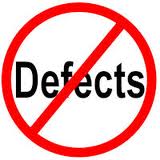A Defect in Torah
The legacy of the Jewish people includes a striving for perfection in ourselves, in our children and in the world. The quest for perfection inherently acknowledges that each of us is imperfect in some ways. In Parashat Emor, such defects are presented as a barrier. If taken on its face, this barrier could be confused for a defect in the Torah.
We read in Parashat Emor at Leviticus 21:21 about the ritual of offerings to the Lord by the priests where it says “no man among the offspring of Aaron the priest who has a defect shall be qualified to offer the Lord’s offering.” The defects noted range from a broken arm to a short leg to crushed testes. One can only suppose that this passage suggests that the priests’ physical imperfections would detract from the holiness or sanctity of the offering.
In our modern religious practices, having abandoned tangible sacrifices at an altar, we strive for perfection in the observance. Why else would we have so many rules about when and where rituals are observed? Take a common example such as lighting Shabbat candles. The exact time of lighting is announced in emails and the methodology of lighting the candles is passed down through the generations. With all of our myriad Jewish rituals, our physical attributes are not the issue. Every Jew, with frailties or abilities, is bound to the laws and traditions.
Yet, in this instance, Torah exhibits a bias against persons whose bodies are less able or less well designed. It is a bias exhibited and limited to the time of making offerings to God and at the altar before the mishkan which is described as God’s dwelling. This exclusion is painful for me to read. After dozens of years of working with persons who are less abled, I’ve known that holiness is often best found in the interaction where abilities and disabilities complement one another. The doctors who heal. The therapists who restore motion. The teachers who educate. They may be the Priests of today. And each one of those professionals have their own defects of some sort. We all do.
If in Torah even a priest with a broken leg that can mend or a growth in his eye that can be healed is not eligible to offer a sacrifice, aren’t we really being told that none of us are eligible? Or perhaps the best explanation is that no one should think of themselves as eligible to make offerings to God if they think of themselves as better than anyone else. We bring our whole selves with our defects to the rituals we perform and in pursuit of perfecting a damaged world. In fact it is our desire to surmount imperfections that fuels the engine of making the world a better place.
Rabbi Evan J. Krame






 Evan J. Krame was ordained as a rabbi by the
Evan J. Krame was ordained as a rabbi by the